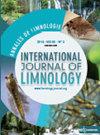可堆肥塑料袋在溪流及其沿岸地区的缓慢降解
IF 0.9
4区 环境科学与生态学
Q4 LIMNOLOGY
Annales De Limnologie-international Journal of Limnology
Pub Date : 2019-01-01
DOI:10.1051/limn/2019017
引用次数: 4
摘要
地球上没有找不到塑料碎片的地方。塑料对美学、生物群和生态系统的影响取决于塑料制品的使用时间,以及在接收环境中释放的降解产物。随着生物基塑料在日常生活中逐渐取代石油基塑料,提高对新型聚合物在自然环境中降解的认识是非常重要的。如今,一次性塑料袋由生物塑料制成,经认证为可生物降解和可堆肥。然而,目前尚不清楚,生物可降解性和可堆肥性的说法是否可以作为塑料袋在回收/堆肥设施外迅速降解的证据。本研究旨在提供关于可堆肥塑料袋在溪流和河岸地带降解的量化信息。我们发现,用不同类型的网袋包裹的塑料样品失重的速度非常慢,尽管在淹没在溪流中时效果显著。在水中浸泡77天后,95%的初始塑料质量仍然存在,而在相同条件下允许分解的桤木凋落叶在研究结束前已经完全消失。塑料样品中呼吸速率和无脊椎动物丰度的测定表明,溪流中的分解者活动比河岸环境中的分解者活动更大。然而,由分解者介导的生物降解可能被介导塑料质量损失的溶解过程所覆盖。我们的发现表明,管理不善的塑料袋可能会影响收件人的生态系统,即使它们被声称是可生物降解或可堆肥的。本文章由计算机程序翻译,如有差异,请以英文原文为准。
Slow degradation of compostable plastic carrier bags in a stream and its riparian area
There is no place on Earth where plastic debris could not be found. Impacts of plastics on aesthetics, biota and ecosystems are dependent on how long plastic items last, and what degradation products are released, in recipient environments. As bio-based plastics tend to replace petroleum-based plastics in everyday life, it is important to upgrade knowledge on the degradation of new polymers in natural environments. Single-use plastic carrier bags are nowadays made of bio-plastics certified as biodegradable and compostable. It is unclear, however, whether claims of biodegradability and compostability can be taken as evidence of rapid degradation of plastic bags outside recycling/composting facilities. This study sought to provide quantified information about the degradation of compostable plastic carrier bags in streams and riparian zones. We found that plastic samples enclosed in different types of mesh bags lost weight at extremely slow rates, albeit significant when submerged in a stream. 95% of initial plastic mass remained after 77 days spent in water whereas alder leaf litter allowed to decompose under the same condition had completely disappeared before the end of the study. Determination of respiration rate and invertebrate abundance in plastic samples showed a greater decomposer activity in the stream than in the riparian environment. However, biotically-mediated degradation by decomposers was probably overridden by dissolution processes in mediating plastic mass loss. Our findings suggest that mismanaged plastic carrier bags could impact recipient ecosystems even when they are claimed as biodegradable or compostable.
求助全文
通过发布文献求助,成功后即可免费获取论文全文。
去求助
来源期刊
CiteScore
2.20
自引率
0.00%
发文量
0
审稿时长
>12 weeks
期刊介绍:
Annales de Limnologie - International Journal of Limnology publishes papers on the ecology of freshwater systems, ranging from studies of aquatic organisms, physical and chemical works which relate to the biological environment, to ecological applications and frameworks for water management directives.
Main topics: Ecology of freshwater systems ; biodiversity, taxonomy, distribution patterns in space and time, biology of animals and plants ; experimental and conceptual studies which integrate laboratory and/or field work on physiology, population dynamics, biogeochemistry and nutrient dynamics, management, mathematical modelling ; techniques for sampling and chemical analyses, ecological applications, procedures which provide frameworks for environmental legislation.

 求助内容:
求助内容: 应助结果提醒方式:
应助结果提醒方式:


